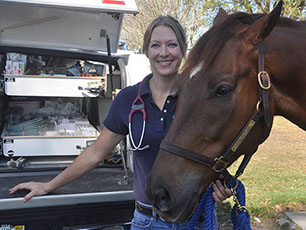General Information

Blue Skies Equine knows that your horse’s health is of the utmost importance, and that many horse owners are interested in learning more about equine health care. Thanks to the internet and social media there is a vast amount of information and opinions available online, unfortunately this information is not always correct and can in some cases is detrimental to your horse’s health. Your Blue Skies veterinarian is your most trusted and accurate source of information, so please never hesitate to call us with your concerns.
The following is some basic health information that is important for all horse owners to know:
Normal Resting Vital Signs
| Adult | Newborn Foal | |
| Temperature | 99.5-101.5 F | 99.5-102 F |
| Pulse | 28-44 beats per minute | 80-100 beats per minute |
| Respiration | 10-24 breaths per minute | 20-40 breaths per minute |
| Gum Color | Moist, light pink | Moist, light pink |
Common Emergencies
Colic
The term colic refers to abdominal pain that almost always is caused by a problem in the GI tract. The causes of colic can range from mild to life threatening and it is one of the most common equine emergencies requiring veterinary assistance.
Signs of colic include:
- Not wanting to eat or abruptly walking away from food in the middle of a meal to lay down
- Repeatedly laying down or rolling
- Looking back at the flank/stomach area
- Pawing
- Stretching (often in geldings this will look like they are struggling to urinate)
Choke
In the horse, “choke” refers to an esophageal obstruction and is different from choking in humans where the airway becomes obstructed. Horses with choke will have feed material, froth, and saliva coming out of their mouth and both nostrils and will also be coughing, gagging, and making retching motions. Some horses become very distressed and will even lie down and roll. In many cases of choke the horse is able to pass the obstruction themselves, however some horses will need to have the obstruction cleared out by a veterinarian. If you suspect your horse is having an episode of choke, please call your veterinarian for further instruction, even if the horse appears to be improving on its own.
Eye Problems
Any horse that suddenly develops a swollen, squinty, cloudy, or excessively tearing eye is considered to be an emergency. A scratched or ulcerated cornea (surface of the eye) can quickly become infected and if aggressive treatment is not started promptly the horse can end up with permanent scarring, a significant reduction in vision, or in worst case scenarios lose the eye.
Lacerations
Horses are notorious for accumulating wounds, and while many minor wounds can be healed with basic at-home wound care, when in doubt it is always better to consult with your veterinarian about the appropriate care for your horse’s wound. Any wound that is deep, large, over a joint, associated with sudden lameness or excessive heat and swelling, shows signs of infection, or becomes a non-healing wound warrants a call to your veterinarian.
Foaling
Parturition in the horse is a fast process once labor has begun, and any deviation from the normal progression is an emergency. Ideally all births will be observed so that intervention can be initiated as quickly as possible once a problem is identified.
- Stage 1: Uterine contractions begin and the mare will show signs of restlessness, flank watching, excessive tail swishing, and sweating. This stage can last between 30 minutes to 4 hours.
- Stage 2: This stage begins when the mare’s “water breaks” and should only last 10-30 minutes. The foal should be delivered with two front feet pointing down and a head between the feet. If no progress is visible 20 minutes after the water breaking, or you only see a single leg, two legs and no head, etc, this is an emergency.
- Stage 3: The final stage is the passage of the placenta. This should happen within two hours of foaling, and if the placenta is not passed within this time please call your veterinarian. A placenta that hasn’t passed in 3 hours, or retained torn pieces of placenta is an emergency that if not treated promptly and aggressively could result in the mare becoming extremely sick.
Foals
A newborn foal should be standing within 1-2 hours of being born, and should be nursing within 2-3 hours. The first milk the foal receives is called colostrum and contains crucial antibodies. If the foal does not get an adequate amount of colostrum it is at risk for becoming septic. If your foal has not stood and nursed within 2-3 hours of being born it needs immediate veterinary assistance. It is also highly recommended that all foals have an exam and their IgG levels checked within 8-12 hours of birth.
In general young foals are more susceptible to becoming sick than adults and can go downhill very quickly so any foal that seems dull, lethargic, stops nursing, or seems off in anyway should be seen by a veterinarian.
Sudden Lameness
Thankfully most often the cause of a sudden and severe lameness is a hoof abscess which is treatable and should not have any long term effects on your horse’s soundness. However, if your horse is suddenly non-weight bearing and also has a hot swollen leg, swelling around a joint, a wound by a joint, or is excessively sweating or shaking, the cause of lameness may be more serious.
__________________________
Please remember that the above is only a list of the most common emergencies. Call your vet any time your horse is acting sick.